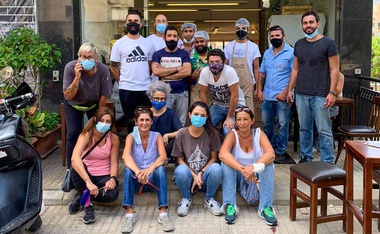In the wake of calamity, the resilience and ingenuity of youth often shine brightly, illuminating paths toward recovery and community rebuilding. The recent efforts of a cohort of young Bahá’ís in Beirut to establish a Disaster Recovery Network exemplifies this dynamic interplay between adversity and the burgeoning capabilities of youth. This initiative not only underscores the inherent strength of community ties and the capacity for collective action but also reflects a profound engagement with the ethical imperatives espoused within Bahá’í teachings.
At the heart of Bahá’í principles lies the tenet of service to humanity—a fundamental commitment that beckons individuals to rise above self-interest in pursuit of the greater good. The youth of Beirut, confronted with the aftermath of a devastating explosion, embodied this principle by banding together to form a network focused on disaster recovery. This grassroots movement serves as a compelling case study for understanding how the teachings of the Bahá’í Faith can catalyze positive change in distressed communities.
The socio-economic climate of Lebanon, characterized by political upheaval and widespread neglect of civic infrastructure, had left many communities vulnerable. The explosion not only exacerbated existing hardships but also revealed the fragile fabric of societal support systems. In this context, the formation of a Disaster Recovery Network by the youth signifies a consciousness that seeks to address these systemic challenges through a framework of solidarity and cooperation.
A salient aspect of this initiative is the emphasis on consultation—a practice deeply embedded in Bahá’í culture. The network’s formation was preceded by dialogues among young Bahá’ís, who convened to assess their community’s needs and devise pragmatic solutions. This collaborative approach fosters inclusivity and adherence to the principle that collective knowledge surpasses individual insight, thereby yielding more comprehensive strategies for recovery.
Moreover, the engagement of youth is a powerful affirmation of the Bahá’í belief in the capacity and potential of young people to enact meaningful change. Educated in virtues such as empathy, collaboration, and resilience, these individuals are uniquely positioned to lead efforts that heal and restore. This endeavor also serves to inspire other demographics within Lebanon, demonstrating that proactive measures can be taken even amidst chaos and disarray.
Another dimension worth examining is the role of education in this initiative. The youth involved in the Disaster Recovery Network have not only mobilized resources but have also provided educational workshops focused on disaster preparedness and mental health support. The Bahá’í Faith places immense value on education as a transformative tool. By integrating education into their recovery efforts, these young Bahá’ís enhance community readiness for future adversities, fostering a culture of resilience rather than reaction.
As the network continues to evolve, it inevitably interacts with broader discourses surrounding justice and equity. The explosion’s impact was not universally felt; it disproportionately affected marginalized communities in Beirut. The network seeks to rectify such inequities through targeted outreach and assistance, thereby embodying another central aspect of Bahá’í teachings: the pursuit of social justice. This endeavor signals an imperative for future leaders to prioritize equity in their recovery efforts, ensuring that no demographic is left behind in the march toward rehabilitation.
In addition to addressing immediate recovery needs, the Disaster Recovery Network also serves as a conduit for fostering interconnectedness among diverse groups within the city. By bridging divides—whether religious, ethnic, or socio-economic—the youth reinforce the Bahá’í principle of unity in diversity. This approach not only strengthens the fabric of the community but also lays the groundwork for long-term peace and reconciliation in a region fraught with division.
The emotional and psychological ramifications of the explosion cannot be underestimated. The trauma experienced by residents underscores the necessity for community-driven mental health initiatives. The network’s incorporation of mental wellness support highlights an awareness of holistic healing, aligning with Bahá’í teachings which advocate for the integration of spiritual and material well-being. By providing accessible psychological resources, the youth address this poignant need, facilitating both individual recovery and collective empowerment.
The efforts of the youth in Beirut underscore a vital aspect of Bahá’í philosophy: the importance of proactive engagement in the face of adversity. This understanding transcends mere charity; it embodies a commitment to fostering well-being and empowerment among community members. As the Disaster Recovery Network continues its work, it serves as a microcosm of what is possible when individuals dedicate themselves to the betterment of society through the application of noble principles.
In conclusion, the establishment of the Disaster Recovery Network by Bahá’í youth in Beirut stands as a testament to the efficacious application of Bahá’í teachings in the realm of community service and disaster recovery. Their initiative exemplifies the potential of youth to incite substantial change, foster inclusivity, and prioritize education, all while advocating for social justice in the aftermath of crisis. By taking actionable steps grounded in the principles of the Bahá’í Faith, these young leaders not only address immediate needs but also pave the way for a more united, resilient, and equitable future for all residents of Beirut. The clarity of purpose and spirit of collaboration imbued in this network is a vital reminder that out of tragedy can emerge profound opportunities for healing and transformation.
